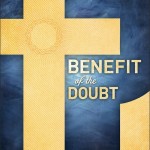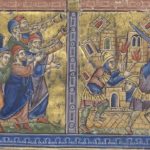We run our website the way we wished the whole internet worked: we provide high quality original content with no ads. We are funded solely by your direct support. Please consider supporting this project.

Do You Argue With God?
Image by michael_swan via Flickr
In sharp contrast to many today who seek the comfortable feeling of certainty as a way of feeling at peace with God, biblical heroes are better known for their willingness to be uncomfortable and to honestly wrestle with God. Like Jacob who wrestled with God through the night (Gen 32), the heroes of faith listed in Hebrews 11 questioned, challenged, argued, and even objected to God’s actions. The father of faith, Abraham questioned God’s justice when he announced his plans to destroy Sodom and Gomorrah (Gen 18:20-33). We see the same several times in the life of Moses. For example, he once boldly objected when God privately told him he was so angry with the Israelites that he planned on destroying them to start over with Moses alone. Moses’s bold intercession succeeded in changing God’s mind and he thereby spared the nation (Ex 32:10-14). In fact we find dozens of examples in the OT of people responding to God’s announced plans by interceding and changing his plans.
Biblical heroes of faith frequently objected to God’s actions—or at least what they thought were his actions. One of the greatest prophets in the history of Israel, for example, was Jeremiah. Yet throughout the book of Jeremiah, as well as its sequel, Lamentations, we find Jeremiah complaining of God’s apparently unjust treatment of him and God’s people as a whole while the wicked have it easy (e.g., Jer. 12:1; 14:8-9; 15:18). His bewilderment and honest objections become especially acute and are mixed with anger and sorrow in Lamentations, written in the wake of Babylon’s seizure of Judah. Read this brief work, and you will find Jeremiah sorrowfully crying out that God has acted like an enemy and a vicious predator (e.g., 2:4-5; 3:1-21) and ascribing to God absolutely barbaric behavior such as ruthlessly slaying young people (Lam 2:21) and causing mothers to eat their own babies (2:20;4:10-11)!
The prophet Habakkuk also is similar. He acknowledges to God that “your eyes are too pure to look on evil” and that “you cannot tolerate wrong-doing” (1:13). But precisely because he believes this, he raises this complaint:
Why then do you tolerate the treacherous?
Why are you silent while the wicked
Swallow up those more righteous than themselves? (1:13)
Sprinkled throughout the book are expressions of anger and confusion about God’s apparent inconsistency, especially as he allows pagans to conquer and abuse his own people.
As is apparent in so many OT heroes, the faith of Habakkuk was obviously nothing like we of think of faith today, that is certainty-seeking and doubt-shunning. They didn’t avoid cognitive dissonance by slapping the “mystery” label on things that seemed like contradictions. Habakkuk and others went to the mat with God. And far from being offended by this raw honestly, God is the One who blessed them with it! For instance, Jacob was blessed by God when given a new name, Israel, after wrestling with God all night, an act that reveals his core identity and character. This apparently is precisely the kind of honest relationship, and the kind of honest faith, God is looking for!
—Adapted from Benefit of the Doubt, pages 82-83
Category: General
Tags: Benefit of the Doubt, Doubt, Faith, Wrestling with God
Topics: Apologetics
Related Reading

The Bible is Infallible NOT Inerrant
While the cruciform understanding (explained here) of the “God-breathed” nature of Scripture is in tension with the way most talk about inerrancy (See previous post on inerrancy), I do not believe it is at all incompatible with what the Church has always sought to express by affirming the “infallibility” the Scripture. The core conviction is that Scripture will…

Is Suffering Part of God’s Secret Plan?
In the Christian tradition since Augustine, the most common explanation for the apparent arbitrariness of life and God’s interaction with humanity has been God’s mysterious will—his “secret plan,” as Calvin says. Whether or not a child is born healthy or a wife is killed by an intruder is ultimately decided by God. If we ask…

Quotes to Chew On: Doubt
Gisela Giardino via Compfight Marcus Goodyear wrote an article back in 2011 reflecting on Mother Teresa’s experience of doubt. Many now know that although Mother Teresa worked tirelessly in the slums of Calcutta, she struggled with doubt and spiritual isolation most of her life. Marcus finds this comforting in some way, and he relates to…

Benefit of the Doubt Is Here!
Benefit of the Doubt is finally here and you should definitely get yourself a copy! Frank Viola interviewed Greg about the book recently and you can read it over on Frank’s blog Beyond Evangelical. In fact, Frank is so enthusiastic about the book that he added it to his Best 100 Christian Books Ever Written list. Wow. Also,…

The Lord of Legend and Love
However secularized a person may be, if they have any sense at all that life has a meaning, they know it must have something to do with love. Indeed, one could argue that all of our intuitions about morality and the meaning of life are at root an intuition about the supremacy of love. At…

Reading the Bible “by Faith”
The cruciform approach to reading the Bible—and specifically the culturally-conditioned and sin-stained portraits of God—requires faith on the part of the reader, which I argue in Crucifixion of the Warrior God. On one level we can discern by faith that often times God broke through the limitations and sin of the ancient authors, for we…
